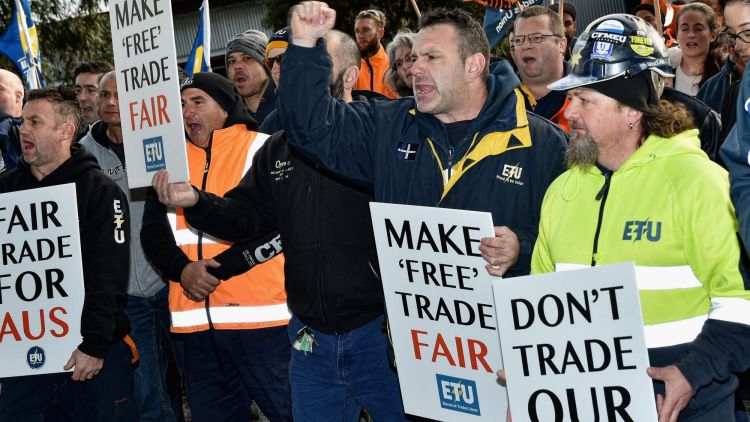Top economists say government claims ‘mythical’ trade deal benefits

The Australian | August 24, 2016
Top economists say government claims ‘mythical’ trade deal benefits
A group of leading economists has criticised the government’s hallmark free-trade agreements, saying the deals fail to lock in key productivity gains and will give a limited boost to Australia’s prosperity.
Arguing the benefits of recent FTAs — with China, Japan, Korea and the US — have been overstated, the economists from Australian National University and Adelaide University accuse the government and the Department of Foreign Affairs and Trade of perpetuating the “myth” of deals bringing “enormous benefits”.
“In each case, the information made available by DFAT about what we have gained has been highly positive, but without any basis in fact,” they write in today’s The Australian [subscription required].
The economists, including former Industries Assistance Commission chairman Bill Carmichael, and ANU’s Martin Richardson and Glenn Withers, say the government has misled the public with feasibility studies projecting potential or possible gains for Australia, rather than what was achieved by the negotiations.
“In each case those projections were subsequently used to create an unreal public perception about the outcome of negotiations,” the group writes. “As a result of this misleading process, each agreement has received public support, because we have had no basis for questioning the myth that each has brought enormous benefits to the economy.”
Pointing to research using an analytical framework developed by the Productivity Commission to assess the economy-wide affects of bilateral trade deals, the group says the US-Australia FTA resulted in a $53.1 billion reduction in trade with the rest of the world.
The economists say the model that should guide trade policy and future negotiations is the position Australia took in the Uruguay Round of negotiations during the Hawke government, which advanced market-opening contributions to global trade reforms.
“As a consequence, we secured all the gains available from trade negotiations — the major gains in efficiency from reducing the barriers protecting our less competitive industries, as well as those available from access to external markets. That produced the win-win outcome ... It made a substantial contribution to the prosperity we have since enjoyed.”
That was not the approach of recent trade deals, where Australia instead pushed a “market-access wishlist” negotiated in secret.
As Australia negotiated new trade deals with the EU and India, the economists say, there should be a different approach to future agreements, including that no deal should be signed without a cost-benefit analysis, a report from the Productivity Commission to underpin negotiations, and a public inquiry and a report to the government.





